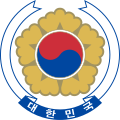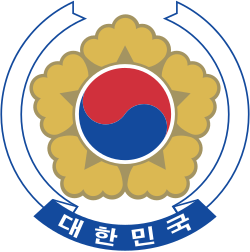
Back حزب سلطة الشعب (كوريا الجنوبية) Arabic Partit del Poder Popular (Corea del Sud) Catalan Strana lidové moci (Jižní Korea) Czech Gungminui-him German Κόμμα Λαϊκής Εξουσίας Greek Partio de Popola Potenco Esperanto Partido del Poder Popular (Corea del Sur) Spanish Rahva Võimu Partei (Lõuna-Korea) Estonian حزب قدرت مردم (کره جنوبی) Persian Pouvoir au peuple (Corée du Sud) French
This article may require copy editing for MOS:OVERLINK, MOS:REPEATLINK, some grammar issues. (December 2024) |
People Power Party 국민의힘 國民의힘 | |
|---|---|
 | |
| Abbreviation | PPP |
| Leader | Kwon Young-se (ERC) |
| Secretary-General | Suh Bum-soo |
| Floor Leader | Kweon Seong-dong |
| Chair of the Policy Planning Committee | Kim Sang-hoon |
| Founded | 17 February 2020 (as the United Future Party) 31 August 2020 (current form) |
| Merger of | |
| Headquarters | 12, Gukhoe-Daero 74 Street, Yeouido-dong, Yeongdeungpo-gu, Seoul, South Korea |
| Think tank | Yeouido Institute |
| Student wing | PPP Central College Committee |
| Youth wing | Youth People Power Party |
| Women's wing | PPP Central Women's Committee |
| Membership (2022) | 4,298,593[1] |
| Ideology | Conservatism (South Korean)[a] |
| Political position | Right-wing[b] |
| Regional affiliation | Asia Pacific Democracy Union |
| International affiliation | International Democracy Union |
| Satellite party | |
| Colours | Red[c] |
| National Assembly | 108 / 300 |
| Metropolitan Mayors and Governors | 12 / 17 |
| Municipal Mayors | 144 / 226 |
| Provincial and Metropolitan Councillors | 529 / 872 |
| Municipal Councillors | 1,433 / 2,988 |
| Party flag | |
 | |
| Website | |
| peoplepowerparty | |
| Korean name | |
| Hangul | 국민의힘 |
| Hanja | 國民의힘 |
| Revised Romanization | Gungminuihim |
| McCune–Reischauer | Kungminŭihim |
| United Future Party | |
| Hangul | 미래통합당 |
| Hanja | 未來統合黨 |
| Revised Romanization | Miraetonghapdang |
| McCune–Reischauer | Miraet'onghaptang |
| This article is part of a series on |
| Conservatism in South Korea |
|---|
 |
| This article is part of a series on |
 |
|---|
The People Power Party (PPP; Korean: 국민의힘; lit. Power of Nationals) is a conservative[a] and right-wing[b] political party in South Korea. It is the second-largest party in the National Assembly. The PPP, along with its historic rival, the Democratic Party, make up the two largest political parties in South Korea.
Originally formed as the United Future Party (UFP; 미래통합당) on 17 February 2020 through the merger of the Liberty Korea Party, New Conservative Party, and Onward for Future 4.0, as well as several minor parties and political organizations.[12] The party changed its name to the current on 31 August 2020.
- ^ 자료공간 | 선거/법규/정당 | 자료공간 | 중앙선거관리위원회. www.nec.go.kr (in Korean). Retrieved 26 March 2024.
- ^ Shim, Elizabeth (28 February 2020). "South Korea president voices concern about Chinese reprisal". United Press International (UPI). Retrieved 16 March 2020.
Hwang Kyo-ahn, leader of the conservative United Future Party, the main opposition, told Moon it might not be too late to implement a ban to prevent a further increase in cases of COVID-19.
- ^ Sang-Hun, Choe (19 February 2020). "Ex-North Korean Diplomat Runs for South Korean Parliament". The New York Times. Retrieved 16 March 2020.
South Korea's main conservative political opposition, the United Future Party, selected him to run in National Assembly elections in April.
- ^ Si-young, Choi (2 March 2020). "Public divided over expanding China entry ban". The Korea Herald. Retrieved 16 March 2020.
Almost 9 out of 10 supporters of the conservative main opposition United Future Party favored a wider ban that covers all of China.
- ^ Ju-min, Park (2 March 2020). "Wristwatch overshadows South Korea sect leader's coronavirus apology". Reuters. Retrieved 16 March 2020.
United Future Party, a conservative political movement formerly headed by Park, denied Lee and the party had any political connections.
- ^ "South Korean Feminists Brace for a "Long, Hard Winter" Under a Right-Wing Leader". The Nation. 18 March 2022.
Sexist rhetoric like this dominated the campaign of Yoon Suk-yeol, the right-wing People Power Party (PPP) candidate who won the presidential election on March 9.
- ^ "Moon promises the sky in Busan but faces electoral crash landing". Nikkei Asia. 9 April 2021.
- ^ Walker, Neil (15 February 2024). "We all have a role to play in fostering a climate for debate". The Journal. Retrieved 17 February 2024 – via PressReader.
- ^ Yang, Mary (27 April 2023). "Nuclear deterrence by day, noraebang by night. This head of state does both". NPR. Retrieved 17 February 2024.
- ^ Hawon, Jung (2 December 2023). "The South Korean woman who adopted her best friend". Al Jazeera. Retrieved 17 February 2024.
After Yoon Suk-Yeol of the right-wing People Power Party won the presidential election last March, the country's gender equality ministry abruptly cancelled plans to recognise a wider range of companionships.
- ^ Salmon, Andrew (5 November 2021). "People's Power Party". Asia Times. Retrieved 17 February 2024.
- ^ '의석 113석' 미래통합당 출범…오늘 의원총회서 상견례. 18 February 2020. Retrieved 18 February 2020.
Cite error: There are <ref group=lower-alpha> tags or {{efn}} templates on this page, but the references will not show without a {{reflist|group=lower-alpha}} template or {{notelist}} template (see the help page).